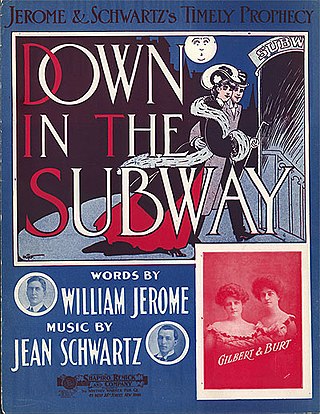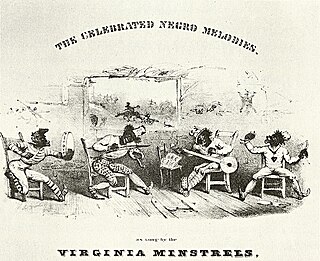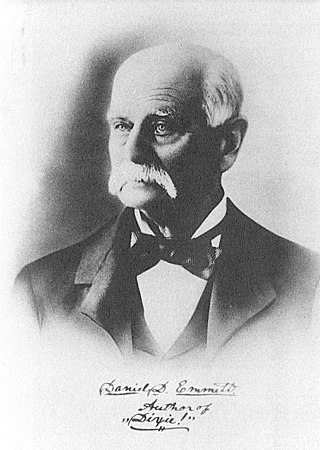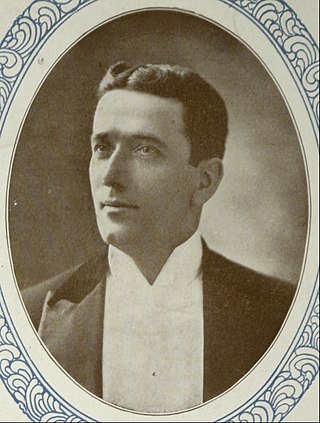
A composer is a person who writes music. The term is especially used to indicate composers of Western classical music, or those who are composers by occupation. Many composers are, or were, also skilled performers of music.

William Jerome Flannery, September 30, 1865 – June 25, 1932) was an American songwriter, born in Cornwall-on-Hudson, New York, of Irish immigrant parents, Mary Donnellan and Patrick Flannery. He collaborated with numerous well-known composers and performers of the era but is best remembered for his decade-long association with Jean Schwartz with whom he created many popular songs and musical shows in the 1900s and early 1910s.

The minstrel show, also called minstrelsy, was an American form of theater developed in the early 19th century. The shows were performed by mostly white actors wearing blackface makeup for the purpose of comically portraying racial stereotypes of African Americans. There were also some African-American performers and black-only minstrel groups that formed and toured. Minstrel shows stereotyped blacks as dimwitted, lazy, buffoonish, cowardly, superstitious, and happy-go-lucky. Each show consisted of comic skits, variety acts, dancing, and music performances that depicted people specifically of African descent.
Bart Howard was an American composer and songwriter, most notably of the jazz standard "Fly Me to the Moon", which has been performed by Kaye Ballard, Judy Garland, Frank Sinatra, Tony Bennett, Ella Fitzgerald, Nancy Wilson, Della Reese, Bobby Womack, Diana Krall, Paul Anka, June Christy, Brenda Lee, Astrud Gilberto, Nat King Cole, Peggy Lee, and Sia, among others. It is played frequently by jazz and popular musicians around the world. Howard wrote the song for his partner of 58 years, Thomas Fowler.

Robert Allen Cole Jr. was an American composer, actor, and playwright who produced and directed stage shows. In collaboration with Billy Johnson, he wrote and produced A Trip to Coontown (1898), the first musical entirely created and owned by black showmen. The popular song La Hoola Boola (1898) was a result of their collaboration. Cole later partnered with brothers J. Rosamond Johnson, a pianist and singer, and James Weldon Johnson, a pianist, guitarist and lawyer, creating more than 200 songs.

Daniel Decatur Emmett was an American composer, entertainer, and founder of the first troupe of the blackface minstrel tradition, the Virginia Minstrels. He is most remembered as the composer of the song "Dixie".
"Jimmy Crack Corn" or "Blue-Tail Fly" is an American song which first became popular during the rise of blackface minstrelsy in the 1840s through performances by the Virginia Minstrels. It regained currency as a folk song in the 1940s at the beginning of the American folk music revival and has since become a popular children's song. Over the years, several variants have appeared.

Sam Lucas was an American actor, comedian, singer and songwriter. His birth year has also been reported as 1839, 1841, 1848 and 1850.

African-American musical theater includes late 19th- and early 20th-century musical theater productions by African Americans in New York City and Chicago. Actors from troupes such as the Lafayette Players also crossed over into film. The Pekin Theatre in Chicago was a popular and influential venue.

Coon songs were a genre of music that presented a stereotype of Black people. They were popular in the United States and Australia from around 1880 to 1920, though the earliest such songs date from minstrel shows as far back as 1848, when they were not yet identified with "coon" epithet. The genre became extremely popular, with white and Black men giving performances in blackface and making recordings. Women known as coon shouters also gained popularity in the genre.
An album musical is a type of recording that sounds like an original cast album but is created specifically for the recording medium and is complete entertainment product in itself, rather than just promoting or reflecting an existing or planned musical theatre production or revue. Although there has been no one term consistently used to describe this type of recording, the genre predates the use of the term "concept album" by several decades, dating back to the era of 78-rpm records with such original works as Gordon Jenkins' Manhattan Tower, The Letter, (1959) starring Judy Garland, and Stan Freberg's Stan Freberg Presents the United States of America, Volume One: The Early Years (1961). On most contemporary concept albums, the performers or bands sing as themselves, whereas on an album musical the performers are playing characters in a story.
This is a timeline of music in the United States from 1820 to 1849.

Barney Fagan was an American performer, director, choreographer, and composer.

Shoo Fly, Don't Bother Me or Shew! fly, don't bother me is a minstrel show song from the 1860s that has remained popular since that time. It was sung by soldiers during the Spanish–American War of 1898, when flies and the yellow fever mosquito were a serious enemy. Bing Crosby included the song in a medley on his album Join Bing and Sing Along (1959). Today, it is commonly sung by children, and has been recorded on many children's records, including Disney Children's Favorite Songs 3, performed by Larry Groce and the Disneyland Children's Sing-Along Chorus.

Joseph Edgar Howard was an American Broadway composer, lyricist, librettist, and performer. A famed member of Tin Pan Alley along with wife and composer Ida Emerson as part of the song-writing team of Howard and Emerson, his hits included "Hello! Ma Baby" and Broadway musicals like "I Wonder Who's Kissing Her Now?".

Thomas Brigham Bishop is best known as an American composer of popular music. Various disputed claims have been made by Bishop and others that he authored, or at least contributed to the authorship of, a number of popular 19th-century songs, including John Brown's Body, When Johnny Comes Marching Home, and Shoo Fly, Don't Bother Me. Bishop later had an infamous career as a bucket shop proprietor, among other schemes.

Annie Hindle was the first popular male impersonator performer in the United States. Born in the 1840s in England, she and her adoptive mother, Ann Hindle, migrated to New York City in 1868. Hall performed as a male impersonator in solo acts and in minstrel shows from 1868 to 1886.

The Jim Crow persona is a theater character developed by entertainer Thomas D. Rice (1808–1860) and popularized through his minstrel shows. The character is a stereotypical depiction of African-Americans and of their culture. Rice based the character on a folk trickster named Jim Crow that had long been popular among enslaved black people. Rice also adapted and popularized a traditional slave song called "Jump Jim Crow" (1828).

James Unsworth was an English blackface comedian, banjo player and songwriter, who performed in Britain, Canada and the United States.
















